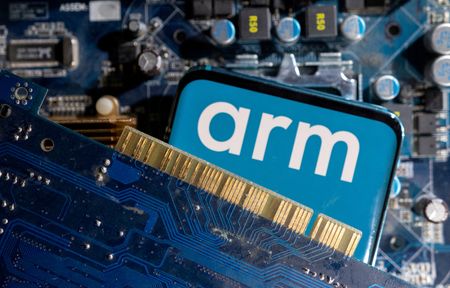By Stephen Nellis
(Reuters) – Arm Holdings on Wednesday released a new set of blueprints for making chips that it says could cut the time required to develop data center processors to less than a year.
Arm, whose underlying technology is widely used in the semiconductor industry and powers virtually every smartphone in the world, has been working to take market share away from Intel and Advanced Micro Devices in the market for data central processors, or CPUs.
Arm, which is majority owned by Japan’s SoftBank Group, argues that its CPUs will become the preferred pairing with Nvidia’s chips in many artificial intelligence data centers, which has helped drive Arm’s shares up more than 60% this year.
Arm’s technology for creating data center processors is already in use by Amazon.com, Microsoft and Ampere Computing, which supplies chips to Oracle. Arm on Wednesday announced a new generation of designs for the computing “cores” – the most central part of a data center chip.
But the larger announcement was that the cores will be offered as part of what Arm calls a “compute subsystem.” That offering ties together the cores with other offerings from Arm into something closer to a complete chip design. Arm argues that customers can use it to go from an initial idea to a test chip in less than a year.
That’s about half the time of a traditional two-year chip development cycle. Arm said that Microsoft already used the subsystem technology to design its “Cobalt” chip announced last year.
“That’s a huge deal,” Ryan Shrout of chip research firm Shrout Research said of cutting down development time.
Shrout said that one of the biggest challenges for traditional chip firms like Intel and AMD was keeping a steady design cadence. Now, Arm is offering to do that work for anyone willing to pay for its blueprints, even if they aren’t a traditional chip company.
“It’s one of the reasons why you’re seeing Amazon, Meta and Microsoft start to build their own platforms and not just build them once, but iterate on them. They’re coming out with new generations relatively quickly,” Shrout said.
(Reporting by Stephen Nellis in San Francisco; Editing by Christopher Cushing)

